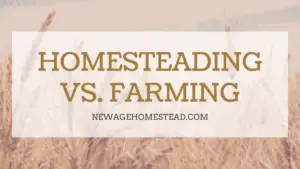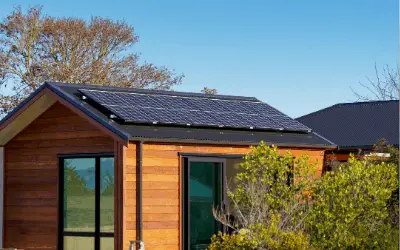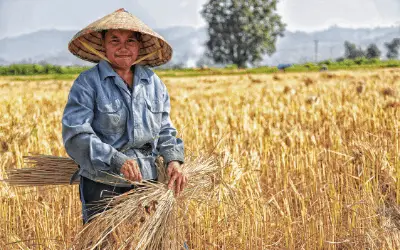There are quite a few differences between homesteads and farming, so I’ve made an article explaining various aspects of both ideas.
Homesteads and farms have many similarities, yet they are different in several ways. I grew up on a farm, often living off-grid. There are, in fact, many things that the two have in common.

Farms are typically either on-grid or off-grid and are full of crops or livestock used to create an income.
However, they can sometimes simply be a food source for the family, while not necessarily being their income or only food source.
Homesteads are completely off-grid and have their food and water sources, such as crops, livestock, water sourced from creeks, rainwater, and more.
Sometimes the two can be intertwined, though, making them hybrid or an all-in-one; I’ll also explain this. Let’s jump into the differences.
Homesteading vs. Farming: The Differences
What Is A Homestead?
They’re Entirely Off-Grid
Homesteads are meant to be entirely off-grid, which means no connections via electricity lines, water lines, cable, and more.
Most commonly, homesteads are powered using solar technology. This may seem like a contradiction, as solar is very technical, but this allows homesteaders to stay off-grid while also keeping electricity.

This also involves water, which can also be sourced locally on the homestead by catching rainwater, sourcing it from a creek or river, or by digging a well or pump, to name a few.
The point is to be self-sufficient and not rely on others for these necessities.
Homesteads Are Self Sustainable
Electricity and water, and the other aspects of on-grid luxuries, as said before, can be sourced on the property. But what about food? This, too, can also be locally farmed and raised.
This may include crops and livestock, such as pigs, cows, chickens, and more.
All of this is locally butchered and, in some cases, dried to extend the shelf life if electricity is not wanted or needed on the property.
In some instances, crops are planted that can be used for medicinal reasons, such as turmeric. Nevertheless, homesteads are meant to be a one-stop-shop for virtually all needs.
Homesteads Offer Flexibility
If you own a homestead, then you already know this, but for those of you new to this idea, let me explain.
Homesteads offer extreme flexibility; this is mainly due to the smaller size of a homestead. Plus, homesteads are not always built and ran in a way to make money.
The crops and livestock on the homestead will not have to be placed in a commercial fashion, such as a cookie-cutter layout. It can be personalized to your idea of convenience.
This is not something that most farms can do; in many cases, they’ll have to run the farm in a straight and narrow path to ensure profits are made; in other words, farms can’t afford to look pretty.
The Similarities To A Farm
Homesteads are in some ways very similar to farms, but they are very different. Farms are not meant to be off-grid or self-sustainable; they’re used for two reasons, more often than not.
The most common reason is to make an income, which can be done by growing and selling crops, trees, and more.
Many farms are also used to raise and sell cows, horses, goats, and other animals like chickens, to name a few.
Homesteads are meant to be personal quarters that can provide everything the inhabitant needs, including food, water, electricity, and medicine in some cases.
The similarities are there, but they are not the same.
What Is Farming?
It’s Designed To Make Money
Farms are designed in a way for the owner to make profits. There are several different types of farms, many that have virtually zero similarities.
Some farms are used to raise only cows for milk, which would be cows milk farms. Others may be used to raise chickens for their eggs, and occasionally, their meat.
Some farms are used to allow visitors to come and view the animals, and in some cases, do things like horseback riding.
Although, most of the time, farms are simply producers of food, which leads to our next point.
Farms Are Food Producers
Most farms are producers of food. Most of the food bought in grocery stores come from these farms, especially the meat found in smaller mom and pop shops.
Nevertheless, the farms are typically designed in a streamlined way to ensure proper animal growth and reproduction to guarantee that supplies do not run low.

Many farms are owned by families, which may use it to feed themselves personally while also making an income.
The oranges, watermelons, and pumpkins that you see in stores are grown on these farms.
Farms Are Commercialized
If your idea of a farm is horseback riding and crop picking, think again. Farming is a complicated business that requires immense hard work and determination to succeed and grow.
This requires everything to be built and ran in a specific and particular kind of way, sort of like it’s on an assembly line.
Farms, mainly if they are large, must be built with efficiency in mind, instead of on convenience or personal touch.
If you plan on ever building a farm, know that you’ll need to have everything set up so the produce or livestock can be harvested quickly.
Think about it; there is a reason why those big cornfields are not decorated like many homestead gardens are.
The Similarities To A Homestead
Although farms have many similarities to homesteads, they are not all too alike. Farms, in most cases, are large plots of land.
This can be either livestock, crops, trees, or animals used to make money in various ways. Homesteads can make money by selling crops and livestock, too.
It’s the other things, like self-sustainability, that make a homestead a homestead. Farms can also be off-grid and self-sustainable, but if that were to be the case, it would be a homestead farm.
Another major difference is that farms require much more equipment than homesteads do. If you were to run a medium to large farm, you’d need all sorts of equipment.
Tractors and accessories such as tillers, bush hogs, processing equipment on the large scale, and a large refrigerator to keep any products fresh are just a few things you’d likely need on a farm.
Essential Points To Think About
Farms Can Fail
If you’re thinking heavily about starting a farm, you should understand that many farms fail, and it’s not always because of human error.
A few factors that can cause a farm to fail are the following:
- Market Crash
- Insect Infestation
- Lack Of Capital
- Poor Accounting
- Unlucky Climate Changes
These are just five of the several ways a farm can fail. You must have capital put back in case any of these scenarios occur.
If the farm is your primary source of income, then you may not be able to handle the incoming mountain effectively financially, leading to the farm’s failure.
This is something to consider that could happen to farms because this is virtually impossible with homesteads.
A farm isn’t what it’s like in the movies, and you probably don’t have the assets to manage the farm as the top-end farmers do.
It’s possible, but it’s essential to know what you’re doing before jumping into it.
Starting a Homestead vs a Farm
Homesteads, as mentioned before, are meant to be self-sustainable and entirely off-grid.
They are made with the idea of not leaving the property to get food, water, and most other necessities. Homesteads can be expensive, but they don’t have to be.
Plus, most homesteads are not going to have extensive gardens or hundred of livestock. In short, it’s much simpler and cheaper.
Farms, on the other hand, have not the resident in mind, but the livestock or crop, with a sole goal of selling the meat and produce to make an income.
Farms cost, in most cases, substantially more than homesteads do and often require much more work to maintain. They also need a lot more capital to start and maintain.
Expertise Isn’t Necessary
In most cases, farming or gardening experience is not needed to start a farm or a homestead. This depends on what type of farm or homestead you’re building, though.
If it’s just a regular homestead with a medium garden and a few livestock, readying yourself with research will suffice, this also holds for small farms.
When you start getting into the larger-scale operations, I’d suggest you either hold off or have someone help you along.
Since you’re probably going to start on a small scale, the experience is not needed. It can even make things more fun because you’ll learn new skills every day for quite a while.
The Cheaper Of The Two
This shouldn’t be the reason for choosing which to go with, because in the end, you’re going to spend several hours of your time on whichever you end up picking.
In terms of start-up price, homesteads are cheaper. Farms can be started on an extremely small scale, as there is virtually no size requirement for the property.
You could potentially start one even cheaper, but we’re talking about the regularly sized farms, nothing that’s too large.
While farms require more money to start up, they’ll make you more money, so it’s a toss-up as to what you choose.
Just make sure you select the one which makes you the happiest, not the one that makes your wallet happy.
Frequently Asked Questions
Are Permits Required?
In most cases, permits are required any time there are mass transactions, so if you plan to sell several livestock each week regularly, then yes.
Selling crops typically do not require such permits unless you sell them to stores, in which case you’d need to pass various health and safety checks, and in some cases, acquire a license, although this varies from county and state.
You’ll need permits if you sell meat, as this almost always requires multiple forms of permits, but they are usually easy to get unless you’re attempting to sell the products to big box stores.
Which Is Best For A Family?
This depends because the two do have several similarities. Farms are more commonly much more enormous than homesteads and often have employees who maintain them.
I have seen some farms run entirely by the family, but this is a massive task to take on for just a few people.
Homesteads are probably the better choice if you plan on relocating your family, because not only are they more straightforward, it’ll be less of a task.
Can I Visit A Farm Or Homestead First?
Many farms are available for public viewing; you’ll just need to do a quick google search in your surrounding area for farms that provide tours.
If you’d like to check out a homestead, perhaps consider looking around on Facebook by taking advantage of the groups dedicated to homesteading.
I’m confident that many would love to take you on a mini-tour of their paradise. This is also a great way to make a few friends.
Verdict
Homesteads and farms have many similarities, but the two are very different. Farming is a way of life; it’s a complex mathematical process that requires immense dedication and hard work to maintain.
Many of them have various kinds of products on the property, like cows, chickens, all sorts of trees, fruits, vegetables, and more, all on a huge scale.
Homesteads are more compact, and most of the time, have enough supplies for the family. Occasionally, homesteaders start small scale farms on their homesteads to make an income, which is entirely doable in most cases.
If you like the idea of both, perhaps consider building a Homestead with a small scale farm and grow it as you see necessary; this way, you have the best of both worlds.
If you feel that you love raising livestock for profit, you could consider using the profits to expand the current property or purchase more property elsewhere.
